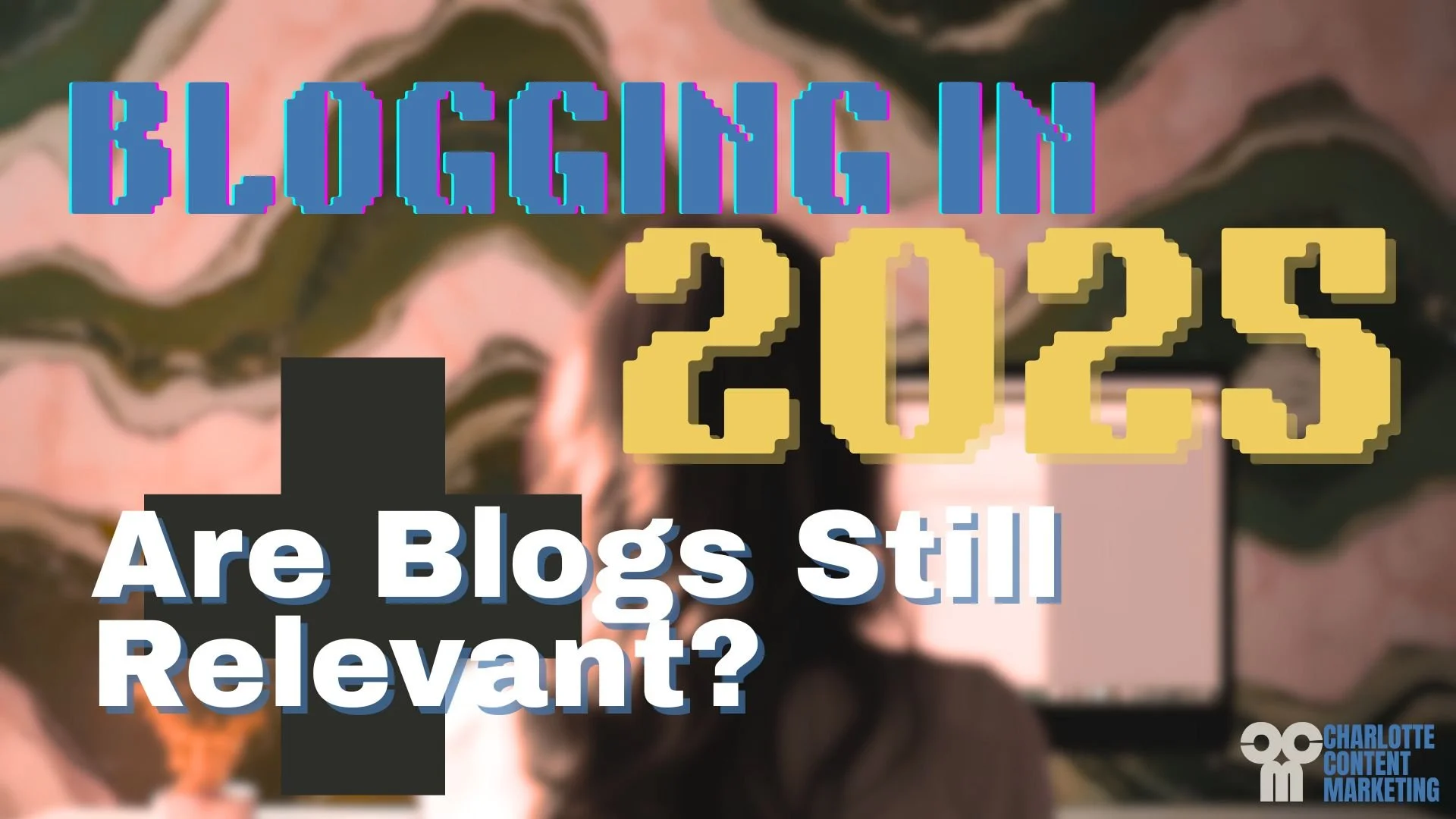Blogging in 2025: Are Blogs Still Relevant?
Blogging has been a mainstay in content marketing for years, but is the juice still worth the squeeze in 2025?
Much like SEO, blogging has been declared "dead" more times than we can count. Yet, here we are in 2025, and businesses, influencers, and brands are still creating blog content (and still seeing results!)
So, the big question remains: Are blogs still relevant?
Short answer? Yes, but only if done right.
How Blogging Has Evolved Over the Years
Before we take a look at whether blogging still makes sense in 2025 and beyond, it’s important to understand the history of blogging.
And no, we’re not going to bore you with some drawn-out history lessen for the sake of filling the page…BUT…it is important to understand how we got here to understand where we’re going.
If you want to get technical, blogs, short for web logs, date back to the early days of the Internet.
Back in the day, people used personal websites as blogs to create pages about various topics and interests. Geocities was one of the most popular options for allowing non-technical individuals the opportunity to stake a claim on a little slice of the Information Superhighway.
In the 90s, people would use personal websites to talk about all kinds of things, and some of those things were just personal anecdotes and daily goings-on. These sites served as web logs, or “blogs.”
For not-so-tech-savvy individuals, options like Geocities and Angelfire offered a way to create simple websites where content could be updated. This gave rise to sites like LiveJournal where users were encouraged to update the site like a diary, hence, the modern-day blog was born.
How Blogs Went from Personal Diaries to Business Assets
While personal blogs were a fun way to get your views and experiences out into the world, they didn’t offer much commercial benefit. The Internet at the time was limited in commercial functionality, and online payment processing hadn’t truly come into its own yet.
As Google rose to fame, searching the web became more efficient. With the rise in search traffic came the need for search engine optimization to get found and stand out.
How SEO Changed the Utility of Blogs
Blogs began to get monetized in the early 2000s as the search engine optimization industry started to come into its own.
SEO professionals realized that they could use blogs to update sites with keyword-rich content without taking away the focus from the main content.
This meant that a business could have a site, sell its products and services in the main content, but then have a blog that opened opportunities for search engines to index new content.
SEO professionals would then create content targeted at specific buyers searching for products and services online.
While SEO can be powerful, some digital marketing professionals have engaged in unscrupulous behaviors known as “black hat SEO”.
The Double-Edged Sword of SEO
When CCM Founder Andrew Rusnak got into digital marketing back in 2010, the industry was focused on keyword stuffing, spammy backlinks, and other “black hat” techniques meant to fool search engines.
“Tricking” Search Engines
Essentially, the goal was to “trick” search engines into ranking content higher by stuffing content with keywords, even if those keywords didn’t make sense to include naturally. Blog posts were the perfect place for these techniques since site owners could continuously publish new content filled with keywords.
Google caught onto these tricks and issued a series of algorithm updates meant to penalize bloggers using shady tactics and reform SEO and blogging practices.
This was among the first times blogging (and SEO) was declared “dead”.
The introduction of AI tools like ChatGPT, Claude, and Gemini has changed the the way we go about blogging, but it hasn’t changed all the rules or diminished the benefits.
How AI Has Changed Blogging (But Not the Rules)
We’ll spare you the rest of the historical details, but suffice it to say, in 2025, gone are the days when blogging was just a personal journal or a way to stuff keywords onto a page for SEO.
The Changing Nature of Blog Content in the AI Era
Today, blogging is about value, authority, and strategic content distribution.
As noted above, blogging was an evolving platform for content marketing efforts before generative AI like ChatGPT and Claude hit the scene, but these technologies have rapidly morphed the purpose and value of blogging.
While Google search remains the dominant form of finding content on the web, AI, social media, federated platforms, and more have slowly eaten away at the search giant’s lead.
People No Longer Just Use Google
AI-generated content and AI-driven search capabilities have changed not only our technology but also the way people search for things on the web.
Search engines and AI assistants (like ChatGPT and Google’s Gemini) now pull content from across the Internet, making it critical for blogs to be authoritative and widely referenced.
Consumers have also expressed the sentiment that Google’s search results have experienced a sharp decline in quality and relevance. This isn’t just us saying this either…take it from Fast Company, Gizmodo, or any number of forums and message boards across the web.
As attention spans get shorter, capturing and holding that attention becomes harder. Short-form content can be a quick answer, but it may not always be the best answer.
Short Attention Spans Seek Short-Form Content
Short-form content is everywhere, and blog content now has to compete. With the dominance of TikTok, Instagram Reels, and YouTube Shorts, attention spans are shorter. This means blogs need to be scannable, engaging, and a media-rich experience.
How Helpful is Your Content?
Google prioritizes helpful content, and this means AI-generated fluff won’t cut it. While AI is capable of spitting out well-written content, it’s limited in that it can’t relay personal experiences and nuanced human understanding and emotion.
This means that blog content should dive below the surface to cover things like:
Firsthand accounts
Unique insights
Personal anecdotes
The nuance of a lived experience
These elements help your content resonate with humans and build trust with search engines.
How you deliver your content and where are just as important as what content you deliver.
The Way You Deliver Content Matters
Your blog should still target keywords and questions your ideal customer is searching for, but the way you deliver that info matters more than ever.
If you're just scratching the surface, AI will win. To compete, you need depth, originality, and a voice that can’t be faked.
Original Ideas, Original Content
Blogs that answer complex questions, share original insights, and demonstrate experience help search engines better understand and rank your site.
Your goal should obviously be to match the search intent of a potential customers ($$$), but the topics you choose to blog about and how you approach them needs to lay a heavy focus on delivering a content experience that AI can’t replicate.
Wondering if a blog alone is enough in 2025? The is most definitely not, but that doesn’t mean that blogging shouldn’t be a part of your content strategy.
Is a Blog Enough?
Content distribution matters more than ever, too. As noted above, a blog alone isn’t enough when your content is competing with short-form video, images that convey ideas, and social media updates.
The good news is that you can compete with these forms of media and stretch your marketing strategy at the same time by repurposing content.
Blog posts or blog topics can be repurposed into social posts, videos, podcasts, and email content to maximize their reach.
Although AI can spit out content at a rapid pace, it grossly misses the mark when it comes to nuance, and this can be a huge drawback when connecting with customers or understanding your business.
Why Blogging Still Works
SEO & Organic Traffic
Despite all of the hype around AI and the massive changes Google has thrown into the works with algorithm tweaks, blogging remains one of the best ways to drive organic traffic.
Well-structured, high-quality, personalized content optimized for search intent can keep your brand visible and attract potential customers.
As mentioned above, although AI search is gaining in popularity, traditional search engines still retain the lion’s share of traffic. And, people still crave unique views from real people, so there’s that, too.
Authority & Thought Leadership
People trust businesses that educate and inform. Blogs help brands establish credibility, whether through in-depth industry insights, case studies, or expert opinions.
Content Repurposing
A single blog post can fuel an entire content strategy—turn it into a LinkedIn article, break it into Twitter/X threads, convert it into an infographic, or expand it into a YouTube video.
AI Needs a Source
AI tools pull information from existing content across the web. If your business isn’t producing content, you risk being invisible in AI-powered search results.
There’s an argument to be made for and against having your content included in AI training data, but for now, we’re leaning into the obvious benefits of inclusion and encouraging our clients to allow inclusion.
In rare instances or for personal reasons, we may discourage inclusion, but currently, the benefits outweigh the drawbacks.
Blogging is still a powerful tool in 2025, but only if you adapt your content strategy to life in the AI era.
How to Make Blogging Work in 2025
Quality over quantity
A few well-researched, high-value posts will outperform dozens of generic ones. Remember: AI can replicate virtually any top-of-funnel content.
If you’re just covering the basics without adding a unique spin or providing personal insight, you’re going to lose out to things like Google’s AI overviews.
Incorporate multimedia Elements Liberally
Back in the day, Internet connections were hit or miss (We still remember 14.4k modems and dial-up Internet.) The inclusion of video and audio was tough for websites because of bandwidth limitations, but these days? Pssshhh! Use video, audio, GIFs, and infographics to engage readers.
Focus on distribution
Share your blog content across social media, email newsletters, and industry publications. Remember to format your content for different platforms. What works for a blog post may not work as well on social media.
Write for People First
Prioritize readability, value, and engagement. As with all content marketing best practices, start with your ideal customer’s goals, passions, fears, and all of the other motivating factors that can make or break a sale.
To make blogging really work for you in 2025 and beyond, personalize your content, and spread your wings! Incorporate multimedia into your content strategy for the best results!
Final Verdict: Blogging is Alive and Thriving in 2025
Blogging isn’t dead, but it has evolved. In 2025, blogs remain a powerful tool for building authority, driving organic traffic, and fueling multi-channel content strategies.
Blog posts are also great for training AI models to learn about your brand, products, and services. In fact, at Charlotte Content Marketing, we’ve seen firsthand how consistent blogging helps train AI models on our clients!
The key is to approach blogging strategically by blending SEO best practices with engaging storytelling and smart distribution.
So, is blogging still relevant? Absolutely…but only if you do it the right way.
Contact Charlotte Content Marketing for a Personalized Overview of Your Content Strategy
At Charlotte Content Marketing, we take a personalize approach to content strategy, planning, production, and distribution. If you’re finding it hard to keep up in the ever-demanding world of content production, we can help!
From video production in Charlotte to onsite podcast production to email marketing, web design, and beyond, Charlotte-area business owners partner with Charlotte Content Marketing for results!
Contact Charlotte Content Marketing online right now, or call us at (704) 323-6762 to schedule a discovery call. Let’s see if we’re the right fit for your company in the Charlotte Metro!












